A hashtag (#) is a symbol that is being used across social media channels to organize, search, as well as expand the reach of different content. On June 12, 2013, the hashtag invaded Facebook. The pressure to stay relevant and the desire to fit in forced Facebook to succumb to the ever-popular hashtag. Since it originated on Twitter, I am inclined to compare the success of hashtags on Twitter to that of Facebook. Although a valiant effort, Facebook has not had the same success seamlessly integrating hashtags into their content as Twitter has had – at least thus far.
#LikeABoss
Why should you incorporate hashtags into your social media content? On Twitter, users incoroprate hashtags to categorize their tweets, create searchable terms, and form a sense of community around a particular topic. Below are 5 enticing reasons to appreciate the use of hashtags on Twitter:
- Organizing Topics- As seen in this screenshot below of the Twitter search result for #WaltDisneyWorld, hashtags make it easy to search for specific keywords or organize conversations surrounding a relevant topic. Grouping these phrases or terms is highly beneficial for brands targeting specific markets because they are able to include relevant hashtags in posts to expand their reach into a specific target market.
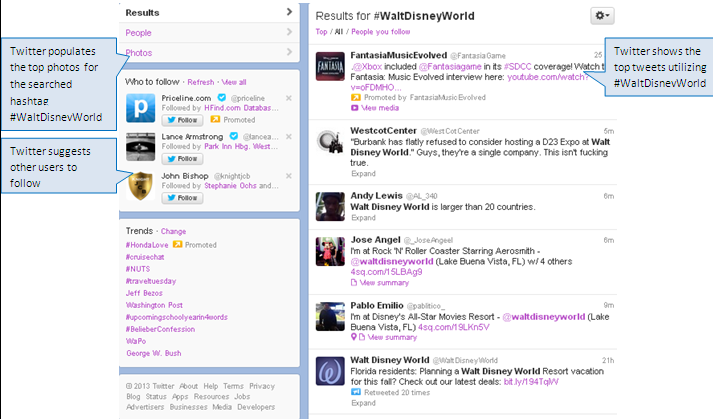
- Creating Searchable Content- Since hashtags create clickable words, users are able to easily search for conversations related to a specific keyword or topic, allowing people to engage in online conversations with friends or strangers alike across the world. For example, if a guest was looking to stay at The Emily Morgan Hotel, they could search #EmilyMorganHotel to find out what other guests at the hotel have been saying on Twitter before deciding to book a room.
- Fostering a Sense of Community- Due to the fact that conversations are able to flow effortlessly around the globe, a sense of community is formed based on specific hashtags that are created for different events, experiences, or contests. These shared hashtags can include anything from phrases and locations to brands and performers. The example below is a conversation on Twitter that is utilizing #DuPageChat. This hashtag was used to discuss town happenings in DuPage County, upcoming events in the area, and residents’ questions in an effort to bring the community together.
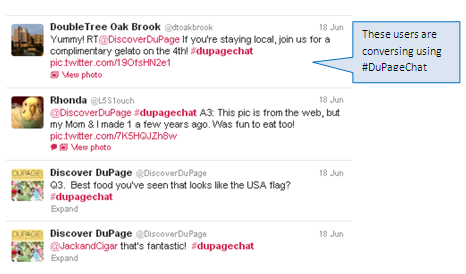
- Expanding Reach- One of the greatest advantages of social media is its global reach. Using the hashtag effectively can broaden your reach because you are able to converse with people across the world who are discussing similar topics in a matter of seconds! As a hotelier, utilizing hashtags can bring in new business too! By monitoring location based hashtags such as #disneyhotel, hotels are able to reach people who are not brand loyal but know the area in which they are looking to travel. This is the perfect opportunity for a hotel to reach out to someone looking for a #disneyhotel and offer a 140 character sales pitch as to why they should stay at this particular hotel for their Disney vacation.
- Providing Customer Service- The hashtag is a great way for hotels to connect with their customers or audience. By monitoring hashtags that include your brand name, hotels are able to provide speedy customer service and respond to any questions or comments guests might have. For instance, if a guest tweets to the hotel asking if he or she will be able to watch a certain TV station in the guest room, the hotel can respond quickly with the information, providing stellar guest services!
#WhatWentWrong?
Ideally, the benefits of using hashtags on Twitter should roll over to Facebook seamlessly, but thus far, I do not think the hashtag has had the same impact on Facebook as it does on Twitter. Although the components of what makes a hashtag so beneficial that I outlined above still play a pivotal role across social channels, Facebook has had a difficult time successfully integrating the hashtag into it’s platform. Here are some reasons why I think the hashtag is destined to be doomed on Facebook:
- Different Demographics – Twitter and Facebook are not attracting the same audience, as seen below in the infograph from Buffer. Facebook holds 67% of all social media users and has a much larger age range, while Twitter has 16% and holds a steady age range. Although the majority of both social media sites’ users range from ages 18-29, Facebook has notably more users in the 50-64 and 65+ than Twitter. This makes an impact when using a hashtag because the older generation does not typically adapt to technology as quickly as 18-29 year olds do. Terminology like twit instead of tweet, or calling it The Facebook (haven’t they seen The Social Network?! JT nixed the “The”!), doesn’t seem to bode well to the future of the hashtag on the social networking mecca.
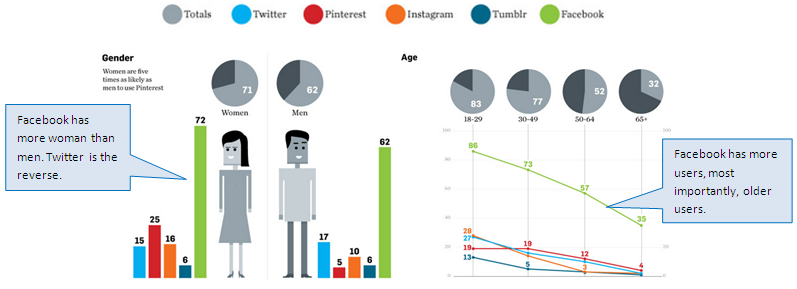
- Misuse Can Lead to a Spammy Experience – As noted in my first point, it is easy for Facebook users to misuse hashtags. The improper use of the hashtag could lead to excessive hashtags in a post, irrelevant hashtags, or a combination of both. Since Facebook already has complaints of too much spam, the hashtag has the potential to inflate that issue. This will not only get annoying fast, but will also make Facebook look like a spammy mess, and no Facebook user wants that. Take for example this post from Berjaya Hotels & Resorts where 19 hashtags were used!
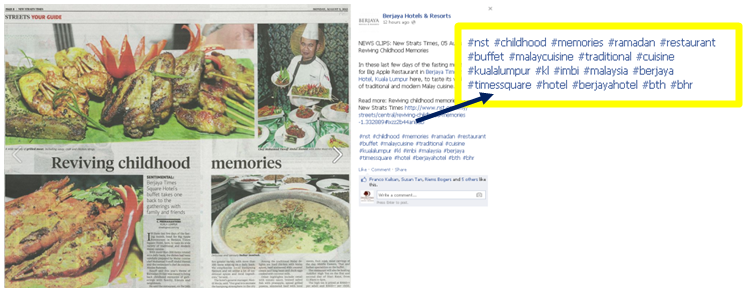
- Not Mobile-Friendly – When Facebook rolled out the hashtag early June, a couple of important features were missing – hashtags were not clickable in the comment sections (the centerpiece of the Facebook conversation platform) and no hashtags were clickable or searchable on mobile devices. Although they recently rolled out clickable hashtags in the comment section, hashtags are still not clickable or searchable on mobile devices. One of the benefits of a hashtag is that it provides users with relevant, timely information, and with more than 140 million Americans using smart phones to access social media, not having the ability to click and search hashtags on a phone totally negates this benefit for a large percentage of Facebook’s users. Facebook has mentioned that they hope to implement clickable mobile hashtags soon, but as of now, the lack of mobile compatability is still a major drawback for Facebook.*
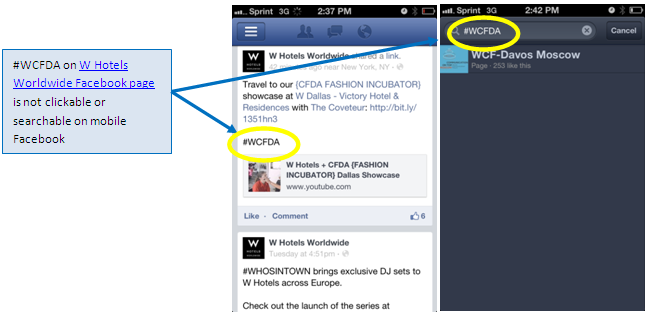
- Privacy Settings Getting in the Way – The final straw in this crumbling attempt to execute hashtags on Facebook is Facebook’s privacy settings. When used on Facebook, hashtags will conform to the privacy settings that a user has set on his or her Facebook account. This means if you compose a status update about an “#AwesomeHotel” and your privacy settings limit your conversations to be viewed by only your friends, then only your friends are going to see that post, regardless of your hashtag usage. This takes away another main attraction of the hashtag, its global presence and ability to foster a community. If only a user’s friends can see their post about an “#AwesomeHotel,” your hotel will never even know that the guest wrote about the #AwesomeHotel on Facebook. Facebook’s complex privacy settings block any chance for the hashtag to have the impact on Facebook that it has on other sites. Although Twitter has similar privacy settings, people are less likely to implement them because of the nature of the social network. Facebook users tend to set strict privacy settings intentionally so they can communicate with family, friends, and acquaintances. It also doesn’t help Facebook’s case that users have compalined pretty loudly in the past about the lack of privacy on the social networking site. On Twitter, 64% of young adults have public profiles, 24% private, and 12% are unaware which type of profile they have. Twitter’s default setting is a public profile.
#AWorkInProgress
Facebook put forth a gallant effort to stay trendy by implementing the use of the hashtag. Unfortunately, I think that Facebook’s efforts thus far have fallen short on this trending topic. With the great probability of misuse, the lack of presence on mobile devices, and the rigorous privacy settings getting in the way of tracking information freely, the odds are against Facebook. Hashtags just don’t translate as well to the nature of Facebook as they do to the Twitter-verse. Facebook is a network for people to connect with acquaintances and friends, while Twitter is more commonly used for sharing news or conversing online with faceless strangers. However, if Facebook is able to adapt their strategy and integrate the hashtag successfully, meaning it becomes mobile-friendly and the older generation begins to understand the benefit and use of a hashtag, then Facebook may have the potential to allow users to categorize, sort, and filter their posts much more efficiently. That said, it is my opinion that Facebook should stick to what they know works well for the over 1.1 billion users they currently have, and that is not hashtags. It seems other Facebook users may share my sentiments on the hashtag – one user even began a public backlash with the invention of this Facebook page named “This is not Twitter. Hashtag’s don’t work here”.
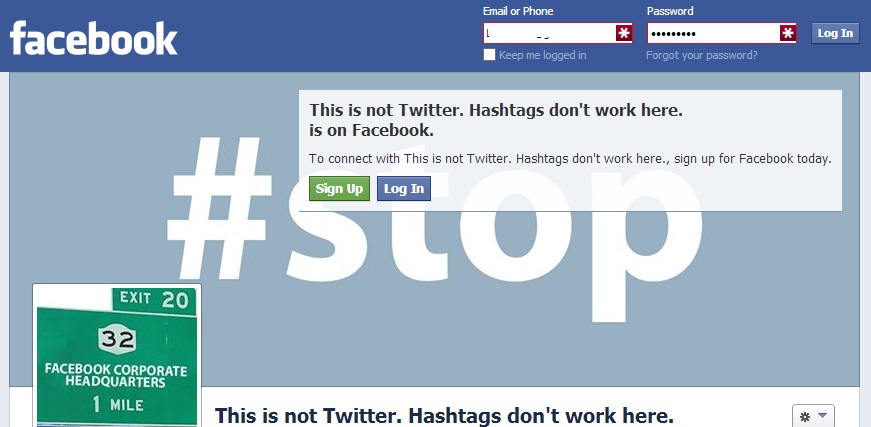
*Update – Facebook has finally added some basic functionality on the mobile platform. Hashtags are now clickable on mobile devices, but users are still not able to proactively search for a particular hashtag.




